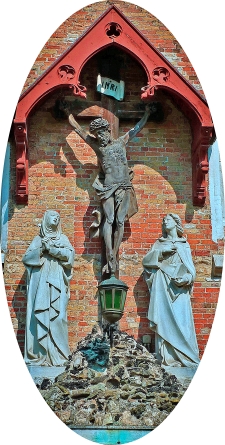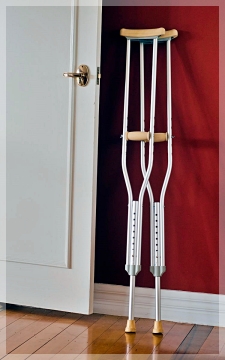On the way, Jesus told them, “All of you will desert me. For the Scriptures say, ‘God will strike the Shepherd, and the sheep will be scattered.’ But after I am raised from the dead, I will go ahead of you to Galilee and meet you there.” [Mark 14:27-28 (NLT)]

In the days leading up to his crucifixion, the people who claimed to love Jesus the most failed him in many ways. We know about Judas—the disciple trusted enough to carry the money bag who betrayed Jesus for thirty pieces of silver. That last night, the deceitful man had the audacity to have his feet washed by the Lord and to drink from His cup! But what of the other disciples? During that same meal, Peter vowed he’d never deny Jesus, even if it meant his death and the rest of the disciples echoed his pledge. Yet, within a matter of hours, those brave disciples would desert Jesus and Peter would deny Him three times. Even though Jesus asked Peter, James, and John to pray and keep watch with him in the Garden of Gethsemane, they fell asleep, not once but twice!
Where were the disciples when the mob shouted for Barabbas to be freed? For that matter, where were all of those people who had been healed or fed by Jesus? Just a few days earlier, a crowd had shouted, “Hosanna! Blessed is he who comes in the name of the Lord!” Where were they? Why were they silent? Instead of calling for Jesus’ freedom, the mob called, “Crucify him! Crucify him!”
The disciples weren’t even there to carry the cross for Jesus; that task fell to Simon, a stranger from Cyrene. Only John, Mary the mother of Jesus, Mary Magdalene, and some other women followers were at the foot of the cross when Jesus was crucified. Disillusioned and fearful for their lives, the other disciples were absent in His dying hours.
Rather than a disciple, it was a dying criminal who attested Jesus’ innocence, showed his faith, and asked the Lord, “Remember me when you come into your Kingdom.” When Jesus took His last breath and died, it was a Roman soldier and not a disciple who declared, “This man truly was the son of God!” The eleven remaining disciples didn’t even help bury their beloved rabbi. That responsibility was taken by Joseph of Arimathea and Nicodemus, members of the Jewish high council and secret followers of Jesus.
The disciples, confused and frightened, failed Jesus both as disciples and as friends. Nevertheless, despite the way they failed Him, Jesus didn’t fail them. Instead, after His resurrection, Jesus greeted them with words of peace and forgiveness. He then opened their minds to understand the Scriptures and charged these men—the same men who once failed Him—with the task of spreading the good news of His resurrection. Jesus knew it is better to be a believer who sometimes fails than not to believe at all.
Be assured, if you walk with Him and look to Him, and expect help from Him, He will never fail you. [George Mueller]

 When considering Solomon’s excess and riches, I recalled comedian George Carlin’s “Stuff” routine. First performed for Comic Relief in 1986, Carlin made fun of our obsession with having stuff. Along with being the King of Israel, Solomon was the King of Stuff. Denying himself nothing, along with his elaborate throne of gold and ivory, he displayed 500 ornamental gold shields on the walls of his palace. Rather than silver, all the king’s goblets and eating utensils were made of pure gold. He had 40,000 stalls of horses for his chariots, and 12,000 horseman.
When considering Solomon’s excess and riches, I recalled comedian George Carlin’s “Stuff” routine. First performed for Comic Relief in 1986, Carlin made fun of our obsession with having stuff. Along with being the King of Israel, Solomon was the King of Stuff. Denying himself nothing, along with his elaborate throne of gold and ivory, he displayed 500 ornamental gold shields on the walls of his palace. Rather than silver, all the king’s goblets and eating utensils were made of pure gold. He had 40,000 stalls of horses for his chariots, and 12,000 horseman. “He’d always looked at religion as a crutch for people who were too scared to do life by themselves,” is the way author Chris Fabry described a character in his book June Bug. That description made me think of Karl Marx’s frequently paraphrased statement: “Religion is the opium of the people.” Sigmund Freud had an equally low opinion of religion and described it as a form of wish fulfillment. Thinking of religion as little more than a man-made coping mechanism for dealing with the harsh realities of life, Fabray’s character, Marx, and Freud disparaged it along with things like crutches and pain relievers.
“He’d always looked at religion as a crutch for people who were too scared to do life by themselves,” is the way author Chris Fabry described a character in his book June Bug. That description made me think of Karl Marx’s frequently paraphrased statement: “Religion is the opium of the people.” Sigmund Freud had an equally low opinion of religion and described it as a form of wish fulfillment. Thinking of religion as little more than a man-made coping mechanism for dealing with the harsh realities of life, Fabray’s character, Marx, and Freud disparaged it along with things like crutches and pain relievers. I lost my first father the same year I gained my second one. I only had my birth father for twenty years, but I was blessed to have my father-in-law for thirty-seven! Dad J lived his life well—with vigor, enthusiasm, joy, laughter, and a whole lot of love. Compassionate and generous, responsible and helpful, good-humored and resourceful, he was a man of faith and integrity (with a large dose of mischief on the side). The Bible might describe him as a man after God’s heart.
I lost my first father the same year I gained my second one. I only had my birth father for twenty years, but I was blessed to have my father-in-law for thirty-seven! Dad J lived his life well—with vigor, enthusiasm, joy, laughter, and a whole lot of love. Compassionate and generous, responsible and helpful, good-humored and resourceful, he was a man of faith and integrity (with a large dose of mischief on the side). The Bible might describe him as a man after God’s heart. While editing photos, I came to one of a pipevine swallowtail. Seeing it on my computer rather than the camera’s viewfinder, I realized it had seen far better days. Its once beautiful wings were tattered and torn, only one “tail” remained, an antenna was missing, and, with many of its scales gone, its wings were more translucent than iridescent blue. Perhaps it had a close call with a predator, the wind had tossed it around, or it simply was old. In any case, it was damaged goods and no longer beautiful.
While editing photos, I came to one of a pipevine swallowtail. Seeing it on my computer rather than the camera’s viewfinder, I realized it had seen far better days. Its once beautiful wings were tattered and torn, only one “tail” remained, an antenna was missing, and, with many of its scales gone, its wings were more translucent than iridescent blue. Perhaps it had a close call with a predator, the wind had tossed it around, or it simply was old. In any case, it was damaged goods and no longer beautiful. As we continued our brief study on prayer, one person shared that his prayer frequently is for patience. Agreeing, I admitted often praying, “Lord, please give me patience…and give it to me now!” While patience is a fruit of the Spirit, I have a problem getting it to grow in the garden of my life.
As we continued our brief study on prayer, one person shared that his prayer frequently is for patience. Agreeing, I admitted often praying, “Lord, please give me patience…and give it to me now!” While patience is a fruit of the Spirit, I have a problem getting it to grow in the garden of my life.